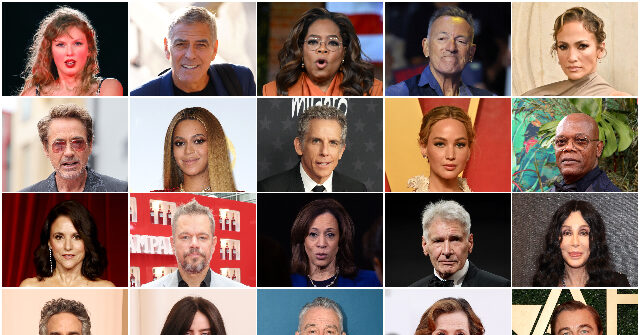As inflation, soaring costs of gas and groceries, open borders, and rising crime rates afflict millions of working Americans, Kamala Harris is increasingly relying on support from affluent Hollywood elites during the final stretches of her presidential campaign. In a move that has drawn criticism for its perceived disconnect from the everyday struggles of average voters, Harris has prioritized the backing of celebrities like Beyoncé, Cardi B, Lizzo, and Bruce Springsteen over substantial outreach in battleground states such as Michigan. Her appearances alongside high-profile entertainers, including a recent stint on “Saturday Night Live” with Maya Rudolph, underscore a strategy that emphasizes star power while sidelining urgent issues that affect ordinary Americans.
In the past fortnight, Harris has basked in endorsements from a multitude of wealthy Hollywood figures, showcasing her connections with a cadre of celebrities who often have little contact with everyday voters. Unlike in the early months of her campaign, when she sought to distance herself from the pitfalls of celebrity culture that plagued Hillary Clinton’s 2016 run, Harris seems to have shifted to a strategy that openly embraces star endorsements. This pivot occurs at a time when Donald Trump’s campaign is gaining traction in crucial swing states, signaling a tactical decision to leverage celebrity influence in an attempt to galvanize voter support.
The endorsement from well-known media figures such as Oprah Winfrey carries significant weight, as research suggests it can sway millions of votes. Despite the star-studded support, Harris’s campaign events have been marred by gaffes and incidents that highlight a disconnect between the celebrity endorsements and the lived realities faced by ordinary voters. While celebrity appearances are intended to energize her base, there have been missteps, such as a lackluster delivery from Beyoncé that disappointed fans during a highly publicized rally.
In addition to established figures, younger stars from various entertainment genres have rallied to Harris’s cause, with musicians and actors engaging in efforts to sway their peers and fans to support her. These endorsements often come with promises to ignore partisan lines, encouraging voters to abandon their loyalties to traditional candidates like Trump. The campaign has harnessed social media and viral content, with celebrity-driven narratives aiming to provoke direct responses from a diverse array of voters.
Yet, the strategy of deploying high-profile endorsements has met with mixed responses. Some endorsements appear shallow or overly politically charged, resulting in backlash, where some figures are ridiculed for maintaining their political narratives. The heavy reliance on celebrity endorsements, along with the perception of elitism that accompanies them, risks alienating voters who feel represented by directly addressing their concerns rather than through celebrity influence. As the campaign for Harris continues to unfold, the effectiveness of this strategy remains to be seen.
While her campaign benefits from a legendary lineup of celebrity endorsements that include longtime supporters and social media campaigns aimed at energizing voters, there’s a growing concern about whether this approach adequately addresses the pressing issues impacting working-class families. As Harris frequents glamorous galas and rallies with Hollywood icons, it’s crucial for her to balance the allure of celebrity with genuine outreach to the very voters her candidacy aims to represent. The stark contrast between the privileged circles she navigates and the plight of countless Americans presents a challenge that her campaign must confront as the election draws nearer.

